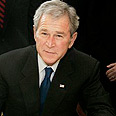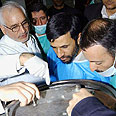
Bush preferred covert plan
Photo: AP

Iran's Ahmadinejad at nuclear facility
Photo: AFP
Report: US refused to help Israel attack Iran
New York Times reports Bush administration rejected Israeli request for specialized bunker-busting bombs it wanted for strike on Tehran’s main nuclear complex, authorized new covert action intended to sabotage Islamic Republic's suspected effort to develop nuclear weapons
WASHINGTON – The United States has decided not to attack Iran's
nuclear facilities and turned down an Israeli request to help the Jewish state strike there itself, The New York Times reported Saturday.
The paper reported that US President George W. Bush deflected a secret request by Israel last year for specialized bunker-busting bombs it wanted for an attack on Iran’s main nuclear complex in Natanz, evaded requests for refueling equipment that would allow their aircraft to reach Iran and return to Israel, and turned down the Jewish state's request to let its aircraft fly over Iraq on their wat to Natanz.
According to the report, Israel has abandoned the idea for now, after estimating that it was incapable of damaging the Iranian nuclear program significantly.
Opinion
Ashley Perry
Is Gaza war an Iranian ploy to divert attention away from nuke program?
Bush was convinced by top administration officials, led by Defense Secretary Robert M. Gates (who is to remain in office in the new Obama administration), that any overt attack on Iran would probably prove ineffective, lead to the expulsion of international inspectors and drive Iran’s nuclear effort further out of view.
The report also suggested that while Bush was extensively briefed on options for an overt American attack on Iran’s facilities, he never instructed the Pentagon to move beyond contingency planning, even during the final year of his presidency.
Gates’ spokesman, Geoff Morrell, said last week that the defense secretary believed “a potential strike on the Iranian facilities is not something that we or anyone else should be pursuing at this time.”
According to the report, the tense exchanges prompted the White House to step up intelligence-sharing with Israel and brief Israeli officials on new American efforts to subtly sabotage Iran’s nuclear infrastructure, a major covert program that Bush is about to hand off to President-elect Barack Obama.
Efforts to penetrate nuclear supply chain
According to the NY Times, Bush embraced more intensive covert operations actions aimed at Iran, having concluded that the financial sanctions imposed by the US and its allies were failing to slow Iran's uranium enrichment efforts.The covert American program, which started in early 2008, includes renewed American efforts to penetrate Iran’s nuclear supply chain abroad, along with new efforts, some of them experimental, to undermine electrical systems, computer systems and other networks on which Iran relies. It is aimed at delaying the day that Iran can produce the weapons-grade fuel and designs it needs to produce a workable nuclear weapon.
There are conflicting estimates regarding to ability to halt or delay the nuclear plan this way, but some say the Israelis would not have been dissuaded from conducting an attack if they believed that the American effort was unlikely to prove effective.
The covert plan had two specific objectives: To slow progress at Natanz and other known and suspected nuclear facilities, and keep the pressure on a little-known Iranian professor named Mohsen Fakrizadeh, a scientist described in classified portions of American intelligence reports as deeply involved in an effort to design a nuclear warhead for Iran.
Bush authorized a broad effort aimed at the entire industrial infrastructure that supports the Iranian nuclear program. Some of the efforts focused on ways to destabilize the centrifuges.
Since his election on November 4, Obama has been extensively briefed on the American actions in Iran, though his transition aides have refused to comment on the issue, the report said.
Early in his presidency, Obama must decide whether the covert actions begun by Bush are worth the risks of disrupting what he has pledged will be a more active diplomatic effort to engage with Iran.















